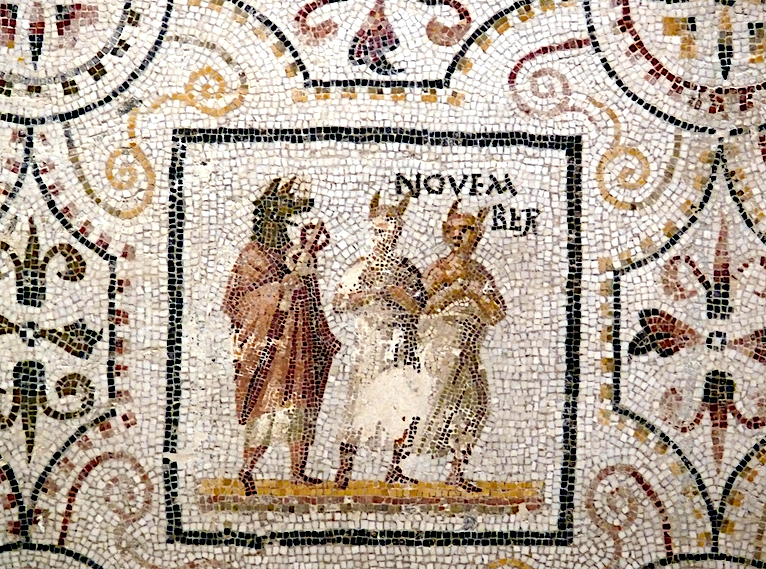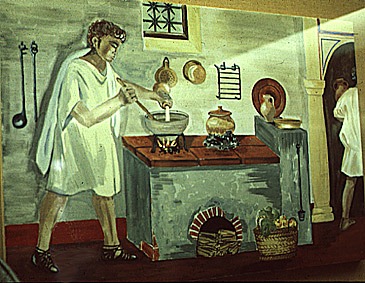A Month By Any Other Number
November 27, 2021
“Gratus animus est una virtus non solum maxima, sed etiam mater virtutum onmium reliquarum.”
“A thankful heart is not only the greatest virtue, but the parent of all other virtues.”
~Marcus Tullius Cicero

My second language is Italian. Not long ago I was helping another native English speaker begin their own Italian language-learning journey. As I prepared a lesson on the words for the days, weeks and months I noticed that the Italian names for the last four months of the year: settembre, ottobre, novembre and dicembre contained numbers that didn’t match up with the months they represented. For instance, “sette” means seven; otto translates to “eight”; “nove” is the Italian word for nine and “dieci” is ten. The English words for the months: September, October, November and December also represent the numbers 9, 10, 11 and 12 (an “octagon” is an eight-sided angle) and I had known about this history years ago, but had forgotten it. Somehow looking at the months in Italian reminded me.
The original Roman calendar was said to have been invented by Romulus, the first king of Rome, about 753 BCE (Before Common Era). The Roman calendar originally used a system of ten months, beginning with Martius (March), named after the god Mars. With Martius being the first month, September was the 7th; October, the 8th; November was the 9th month and December the 10th.
In 45 B.C. Julius Caesar created the Julian calendar based on the Earth’s revolutions around the Sun, replacing the Roman calendar, which was based on the phases of the Moon.
The Julian calendar placed Januarius and Februarius (named after the Gods Janus and Februus) as the first two months of the year. Quintilis (5th month) and Sextilis (6th) were now the 7th and 8th months and were eventually renamed after Julius and Augustus Ceasar, becoming July and August. September became the 9th month, but for some reason kept its former name (along with October, November and December).
Celebrating New Year’s Day on January 1 began with the Julian calendar in 45 B.C.
So, our eleventh month named after “nine” and the twelfth month of our calendar named after “ten”, remind us that not everything has to make sense and to celebrate the end of year holidays with joy, humor, tolerance and love.
“Except for love, nothing you see will remain forever.”
~ Rumi
~~~~~~~~~
I based Barley and Roasted Pumpkin Porridge on an ancient recipe created by the Roman statesman, Cato the Elder.

Barley and Roasted Pumpkin Porridge
A hearty and healthy vegetarian meal fit for a Roman soldier (and a nice, nutritious break from rich holiday foods). If you have leftover fresh pumpkin from Thanksgiving, you can use that. For faster preparation, you can substitute frozen, diced butternut squash for the pumpkin and/or use quick-cooking barley (decrease cooking time accordingly). If you do use a fresh pumpkin, be sure to save and toast the seeds for a nutritious snack (instructions given at end of recipe).
3 cups diced pumpkin (I used a sugar pie pumpkin)
5 tablespoons extra virgin olive oil
2 tablespoons honey
1/2 teaspoon salt
Freshly ground pepper, to taste
1/2 teaspoon ground cumin
1 small onion, diced
1 & 1/2 cups barley
32 oz carton of vegetable broth
4 oz crumbled goat cheese, such as feta
1/2 cup pine nuts
1/2 cup chopped parsley
Preheat oven to 350°F
Cut pumpkin into wedges and remove seeds. Peel skin from pumpkin (if this is too difficult, try microwaving the chunks to soften a bit, then peel). Chop pumpkin flesh into small chunks (you want to end up with about 3 cups of chunks).
Arrange chunks on a shallow roasting pan. Sprinkle with salt, pepper and cumin. Drizzle with the honey and 2 tablespoons of the olive oil (you will use the rest of the olive oil to fry the onion). Stir everything together to coat evenly. Bake for 25 to 35 minutes, or until fork tender (you can stir a couple of times during roasting). Remove and set aside.
Toast pine nuts:
Add pine nuts to a large saucepan and turn heat to medium. Cook, stirring frequently, until just golden (nuts will keep cooking after you remove them from the heat). Remove to a flat dish to cool and continue with recipe.
Using the same large saucepan, add remaining 3 tablespoons of olive oil and increase heat to medium-high. Add onions and cook a few minutes, stirring, until onions begin to soften. Add barley and stir to coat. Add broth and bring to a boil. Reduce heat to a simmer and cover pan. Simmer for 25 to 30 minutes. Turn off heat and let stand, covered, for about 10 minutes, to thicken.
Stir in roasted pumpkin and cheese. Taste and add salt and pepper, if desired. Serve hot, topped with chopped parsley and toasted pine nuts.
Serves 4 to 6
To roast pumpkin seeds:
Rinse seeds in a mesh strainer, to remove bits of pumpkin string. Heat oven to 300°F. Spread seeds in a lightly oiled pan and heat 20 minutes, to dry out. Stir seeds with a little olive oil and sprinkle with salt and dried, crumbled rosemary (optional). Bake for about 20 minutes more, or until crisp, but not burnt (taste one to check). Yummy!
November 30th, 2021 at 12:46 pm
Very little things make sense lately but this recipe is helping to change my mind.
December 15th, 2021 at 1:42 pm
Absolutely fascinating! I just realized that Romulus, the first emperor of Rome, is who the Star Trek Romulans were named after?